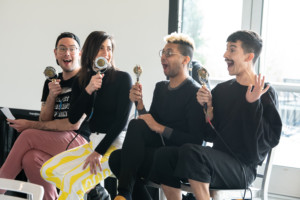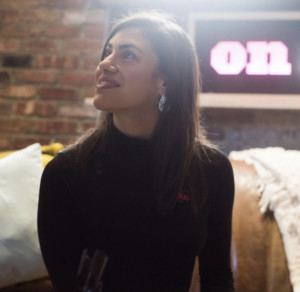“She’s our lighthouse, and has a knowledge of her craft that is simply mind blowing.”—Tommy Pico
The want ad read “gay podcast looking for gay people,” and Alexandra DiPalma knew it was her ticket out of the branded audio content doldrums. She signed on to produce Food 4 Thot, “a podcast gabfest wherein a multiracial mix of queer writers gather ‘round to talk about sex, relationships, race, identity, culture, what we like to read, and who we like to read,” shortly after its first season began. “I was feeling creatively unfulfilled while working on the branded side of Stitcher,” DiPalma says. “The timing was just right when I joined Food 4 Thot. I don’t think I would’ve been open to an unpaid gig any time later in my career, but getting to work on something so fun and creative like this helped me remember why I wanted to get into audio.” Within three seasons, the podcast was getting nods from none other than Oprah.

DiPalma clicked right away with hosts Denne Norris, Fran Tirado, Joe Osmundson, and Tommy Pico, and set to work shaping the show by identifying what the audience would also love about each of them. “They recorded their pilot episode the night of the 2016 election, and listening back, their personalities weren’t fully there. They sound completely different, which is so normal.” While the general structure remains largely the same to this day, DiPalma worked with the hosts to create recurring segments and experiment with formats to draw out their characters.
“Tommy is a performer, so he was always the most comfortable on mic and leading the conversations,” says DiPalma. “But [the hosts] met as the only queer people at a writing workshop, it’s not going to be the same as trying to create a show with a bunch of comedians. Joe would be the first to say this—he was an academic and a writer, so he wasn’t out there the way Tommy was, and he needed that structure to allow himself to be comfortable and let his personality come out.” As the producer, it was crucial to figure out a format that allowed the group to develop their rapport. Now the conversation is so natural and lively that it’s surprising to learn that DiPalma edits their two-hour conversation down to an hour-long episode that feels like perfectly paced eavesdropping on a group of friends.
“Alex makes it seem effortless and ever-moving,” says Osmundson. “It takes a lot of work to make a four-way conversation seem to flow seamlessly. Our show sits between the highly produced shows where every ‘umm’ is considered by at least three staffers and two editors, and free-wheeling shows where a bunch of dudes talk for four hours. We show our work and imperfections, but (hopefully) never bore, and that balance is 100 percent due to Alex’s eye.” That editing process largely comes down to trust between the hosts and producer, something that can be a challenge to develop, especially in more corporate environments. Luckily, DiPalma and the Thots have become fast friends, and the final product reflects an intimate understanding of the hosts’ strengths, sense of humor, and relationships with one another.
“I have so many friends who are musicians and they always tell me that Food 4 Thot is like a band,” says DiPalma. “We’ve been together for so long, and we work together really closely. We travel around the country together. There are tensions between the hosts sometimes, but I think it’s super interesting for people to hear those tensions. The Thots will give me notes on each episode—some will give me much more than others—but typically speaking I have the final cut, and they seem to trust my call.” Pico agrees. “I implicitly trust her instincts regarding all aspects of our show,” he says. “She’s our lighthouse, and has a knowledge of her craft that is simply mind blowing.”
This dynamic is also a reflection of the more democratic environment of an indie podcast, and is likely why the producers of shows like Food 4 Thot so often break through the background to become part of the fabric of the show that draws listeners in. “When I was working with branded content, I never left a meeting where I felt like my work was valued, or I was valued, or my opinions were valued,” says DiPalma. “It was just about getting to the finish line, hitting our marks on a production schedule.” The hierarchy between the producer and the hosts of more corporate shows, and the distance kept between the two, stifled DiPalma’s ability to create work that lived up to her standards. After Food 4 Thot took off, DiPalma only wanted to work on projects that fulfilled her in this same way, and she knew she wasn’t going to reliably find that as part of a larger company. In 2018, she founded Domino Sound with her girlfriend, Kenya Denise, to establish a home for podcast projects by people who might otherwise not find success in the industry.
“I don’t want to reach the people who are listening to Reply All, because they already have their show! You know what I mean?”—DiPalma
“There’s so much to be said about how the people who are in power in the podcast industry are straight white men, and that’s just on period,” says DiPalma. “Our motto is ‘doing things differently,’ and there really isn’t another podcast company that looks like ours and functions like ours in terms of the leadership and the decision-making and the power. It was very intentional for us to have the people in power be queer women, Black women, and that’s it.” They seek out projects created by and for queer and POC audiences, yes, but they are also invigorated by anyone willing to try out something new that would reach unique listeners. “I don’t want to reach the people who are listening to Reply All, because they already have their show! You know what I mean?” says DiPalma.
Working with creative partners who are fulfilling on such a personal level can have its downsides, however. “When you have these deep relationships with the people you work with, it can get really emotional. When that’s going well it’s fucking amazing; it’s not like I’m on work calls all day—I’m talking to my friends and these people I respect and who I feel so lucky to learn from,” says DiPalma. “But when it’s an eight-month-long project, of course there are going to be hard days, and on those days—I don’t know, I’m a Cancer so maybe it’s a Cancer thing—it feels much harder to then separate that from your personal life. You’re not clocking in and out, you’re really entwined in your work where your work relationships become your personal relationships. Those personal relationships are then strained by what we’re doing, and it hurts more when the people you’re working with don’t like this idea or the project’s not working. It’s more emotionally fraught.”
DiPalma’s curatorial instincts are evidently of-the-moment, and these relationships ultimately produce work that stands out from an increasingly crowded market. In this past year, as the pandemic and civil rights protests brought social justice issues to the forefront of our national conversation, the search was on for creatives who could bring a new perspective to the table. Domino boomed as investors grew eager to produce stories outside of the mainstream, and a year into the pandemic, DiPalma was struggling more with finding some time to rest than finding work. There was the impending new season of Food 4 Thot, a collaboration with TED (Lost Birds, with Mona Chalabi), two television production projects in the works, and potentially translating their previous productions for a foreign podcast market. It’s clear the industry is valuing voices like DiPalma’s more than ever before, even if there is still much work to be done.

DiPalma will also be helping shape the future of podcasts through her educational outreach. Back at Stitcher, she was paired with Seth Godin to work on his podcast, and the two hit it off. Godin was already running successful writing and marketing workshops, and he approached DiPalma with the idea of starting a podcasting workshop together. DiPalma hadn’t taught in any capacity before, but agreed to try it out. Over 400 people signed up for their first online workshop, and The Podcasting Workshop has been a success ever since. “At the end of those seven weeks, people will come up to me saying how it was a life-changing experience,” says DiPalma. “I never realized how rewarding it would be to give people these skills and tools to step outside of their comfort zone and their 9-5 job to discover their creative interests.” Education is now something DiPalma hopes to incorporate into her career outside of her collaboration with Godin.
In addition to her role as a teacher and independent projects she takes on at Domino, DiPalma also enjoys learning what the next generation of podcast creators are making. She sees YouTube as a huge cultural influence on younger creators, but doesn’t think older producers have quite landed on how to translate the often frenetic, scrappy production styles of YouTube videos into audio when they attempt to cater to Gen Z. “It needs to be radically different from the formats we’re accustomed to now, and I think the younger people getting into podcasting now are the only ones who are going to be able to figure it out authentically,” she says. “I love being a part of them finding their voice.”
At the end of each Food 4 Thot episode, one of the hosts shouts out DiPalma with a unique superlative. Most of them aren’t quite suited to the tone of this article, but the picture they paint of DiPalma’s impact on their production is clear. She is both the hosts’ “favorite cat lady in a catsuit” and someone who “puts the ‘pro’ in prosecco.” Her voice stands out as a beacon for creators and audiences who have likely felt excluded from the mainstream podcast world, and the heart of her productions lies in her relationships with her hosts. “When Alex came onto the Food 4 Thot team, there was no question that she would be more than just a producer,” says Tirado. “We saw her passion and candor that supersedes anything a Gimlet or an iHeart can do. Her ease, vibes, and morale-boosting energy bring so much into the chemistry that is our podcast, and we wouldn’t be where we are without her.”




Comments